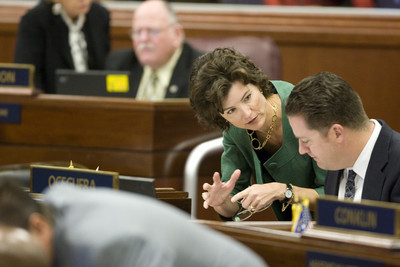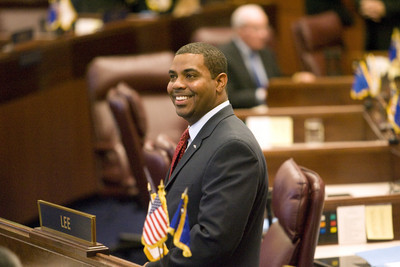Tougher decisions looming
Most legislative sessions don't start with a dress rehearsal. But last week's special session gave a sneak peek at what may lie ahead when the Nevada Legislature's regular session begins in February.
The one-day session, in which legislators cobbled together a patchwork of loans, cuts, tax modifications and spare change to cover a $340 million budget gap, went more quickly than anyone expected, finishing its business in less than nine hours.
In the state Senate, where Democrats have a new majority and a new leader, bipartisan consensus was the order of the day, with a single dissenting vote on all four measures that were approved.
In the Assembly, which Democrats now control by a two-thirds margin, Republicans wavered between staying on board and dissenting in protest, to no effect. But Republican Gov. Jim Gibbons, known for his opposition to tax increases, ignored those who declared themselves too conservative to support certain measures and signed onto all the legislation he had helped negotiate.
New state Senate Majority Leader Steven Horsford, D-Las Vegas, said it was the urgency of the situation that weighed on legislators and kept them focused.
"I think we saw a committed group of public servants who were faced with really bad choices making the best of a bad situation," Horsford said.
Because the broad strokes of the compromise were worked out in negotiations ahead of time, "you saw people working together, finding consensus, being cooperative, respecting each other's opinions," he said. "The reality painted the picture of what had to be done, as difficult as it was."
A grueling regular session is expected when lawmakers return to Carson City on Feb. 2, with the projected biennial revenue of $5.7 billion some $2.4 billion short of what would be needed to maintain already reduced service levels. But Horsford said the special session gave him hope that the gravity of the situation might inspire normally fractious legislators to rise above partisan bickering and put their collective shoulder to the wheel.
"I think what I see is opportunity out of the whole situation" of fiscal crisis, said Horsford, the first black state Senate majority leader and at 35 the youngest in Nevada history to hold that post.
"It's an opportunity for us to look at things differently, to approach our decisions differently, to kind of take advantage of this moment of urgency to do what's right for the state. It's not a Democratic issue or a Republican issue; it's a Nevada problem, and the solution's going to have to come from all of us working together."
Horsford and others have lauded the grace exhibited by state Sen. Bill Raggio, R-Reno, the formidable former majority leader whose title changed to minority leader in last month's election.
The 82-year-old Raggio, prevented by term limits from running again, has shown no rancor in joining the negotiations from his new position and undertaking to tackle the crisis with an air of great seriousness.
"I'm not looking at legacies," Raggio said. "What I have done over 50 years of public service -- 18 as a prosecutor, 36 as a senator -- I always tried to do what I thought was right. That's going to be my guiding principle. I'm going to do what's right for the state of Nevada, and I'm not looking for certain sectors of the state to approve."
Because the Democrats' 12-seat majority in the 21-seat upper house is two short of two-thirds, they will need Republicans to pass some bills.
"Many things require a two-thirds vote, so we will have a role," Raggio said. "They will need our votes."
Raggio said members of his caucus agree with him on the need to put policy above partisanship where possible, without abandoning principle in the process.
"I'm not an obstructionist," he said. "My core principles are still important. The reason I'm a Republican is I believe in limited government, keeping taxes low, free enterprise and fiscal responsibility. Having said that, I want to help run the train. I don't want to wreck the train."
Raggio expressed scorn for Assembly Republicans who went against two of the negotiated measures on party-line votes led by a revolting conservative "caucus" within their ranks. The move was a slap to their own party's governor, Raggio said.
"I guess it's their right to do that, but I don't agree with their approach," he said. "I was elected to resolve problems, not create problems."
Assembly Minority Leader Heidi Gansert, R-Reno, said she warned the other legislative leaders during negotiations that she and other Assembly Republicans likely would not support the tax measures -- returning to the government portions of the taxes on rental car companies and some retailers that the businesses previously were allowed to keep -- which she viewed as unnecessary and tried to strip out of the bill.
On another bill that dealt with rural land leasing, she said, some information was presented in hearings that changed lawmakers' minds. Gansert said those votes should not be taken as evidence that her caucus would rather pout on the sidelines than contribute to the debate.
"We always want to be at the table and part of the discussion," she said. "We represent a large portion of the state geographically. Our voices are extremely important, even though we're in the minority."
Assembly Speaker Barbara Buckley, D-Las Vegas, said she appreciated that Gansert had reached out after the session and "expressed some regret for any miscommunication between her and the rest of the legislative leadership and the governor."
As for the Republicans who have declared themselves unwilling to go along with what they say is Buckley's liberal agenda, she said, "What was Barbara Buckley's liberal agenda this special session? To work with the Republican governor and the Republican Senate minority leader to come up with a solution to the state's devastating financial problem? That's a Nevada agenda. If they don't want to participate in solving Nevada's problems, it's a loss to their constituents."
Numerous policy issues are likely to be on the legislative agenda, including potential reforms to education and public-employee benefits, expanding health care coverage, reforming public health policy in the wake of the hepatitis C crisis, increasing renewable energy projects in the state and addressing problems with homeowners associations.
But nearly all the political focus will be on the billion-dollar question of whether to expand the state's revenue base -- that is, raise taxes.
Gibbons, who must present the budget draft for legislators to work from in mid-January, has said he will stick to his pledge not to raise taxes, instead freezing public employee wages, consolidating departments and making further cuts.
Between 2007 and last week, however, he has shown a willingness to embrace creative ways of collecting more state revenue from people and businesses as long as the T-word isn't used. If two-thirds of legislators in both houses agree on something Gibbons opposes, they can override his veto.
Other than liberal Democrats in safe districts, legislators do not generally say outright that raising taxes is what they will seek to do, but both sides of the aisle are beginning to admit that there may be a point where they view it as necessary. Even the fiscally conservative Las Vegas Chamber of Commerce, which has a powerful lobby in the Capitol, has lately endorsed the notion that there may not be a way around it.
"Taxes are always a last resort," Gansert said. "It's my hope that we can craft something that, with the challenges we face economically, will not increase the burden on taxpayers. But of course we have to balance the budget. We have to provide services to people."
Lawmakers say first they'll look for aid from the federal government. Horsford, who helmed President-elect Barack Obama's 12-point win in Nevada, said it was an encouraging sign that Obama, a former state legislator, met with governors shortly after the election.
Lawmakers then will reexamine tax exemptions that have been written into the law over the years to see if they still are appropriate.
But like a family that budgets for basic necessities, legislators say they need to decide what the state cannot live without.
"After you examine all of that, if there is a gap, what are the solutions to solve it?" Buckley said. "You can't leap to conclusions until you process all your priorities, what you absolutely need. ... We are going to be looking at a 34 percent cut in revenue. With 93 percent of our state revenue going to education, health care and prisons, which have already been cut, we are going to have incredible challenges."
Raggio took the floor of the state Senate in Monday's special session to proclaim that it was very easy for those outside the process to chant "cut, cut, cut," but harder to make the tough decisions. He said for now, he is waiting to see what Gibbons proposes and does not doubt "deep cuts" will be required.
"Raising taxes during this economic downturn is a last resort. That is an opinion shared across the private sector and people we represent," Raggio said. "I'm not going to take anything off the table. I'm not advocating a tax increase. We've cut pretty deep already. We've used one-time money; the $160 million line of credit will have to be repaid to the extent it's used; there's no rainy day fund left; we've swept reserves that are sometimes necessary, and they're going to have to be restored. It's easy to be a critic, rather than offering solutions."
Horsford said he agreed with Raggio's sense that "it's not as simple as just saying 'No,'" and with Assemblywoman Peggy Pierce, D-Las Vegas, who voted against a budget-cutting bill in the special session because she believes it's time to stop cutting and start increasing revenue.
That wasn't feasible in the special session, Horsford said, but "I don't disagree with her that we've got to stop cutting. ... In the regular session, after we've gone through the budget process, clearly there is an indication that we may need more revenue. I think it's going to be our responsibility to figure out how to balance the budget."
There's no doubt, Horsford said, that further budget cuts are coming, but that may not be enough.
"We've got to see what the governor proposes first and react to that. Then, if it looks like there is a budget shortfall from what we know are the essential services of state government, after we've made the necessary cuts, I think that taxes will be an option that the 2009 session will consider."
Contact reporter Molly Ball at mball @reviewjournal.com or 702-387-2919.























